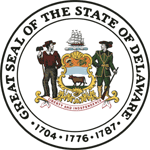Dover, DE – Gov. Jack Markell today signed into law a package of House bills that expand and strengthen Delaware’s Freedom of Information Act. The bills were introduced in early May and passed both chambers of the General Assembly with unanimous votes.
The new laws cover posting of meeting minutes, mailed FOIA requests, publishing of annual reports and education of FOIA coordinators.
The package represents a continuing effort to broaden government transparency and allow citizens to stay up-to-date with their state and local public agencies and more easily access public records and documents.
“In 2009, we brought the General Assembly under the FOIA umbrella, and since then we’ve routinely drafted and passed bills that expand FOIA in various ways,” said Majority Leader Valerie Longhurst, D-Bear. “This effort is ongoing and there’s always more we can do to promote the public’s right to know.”
“A transparent and open government is vital to ensure people have access to the information they deserve to fully participate in our democracy,” said Governor Markell. “We’ve made great progress in the last few years to that end, enacting in 2011 the biggest changes to the FOIA law since it took effect in 1977. This legislation supports our ongoing efforts to make state government more transparent, efficient and responsive to our citizens.”
The package signed into law today consisted of four House bills:
- House Bill 320, sponsored by Rep. Kim Williams, requires public bodies that meet four or fewer times per year to post draft meeting minutes online within 20 working days of the end of the meeting. Currently, a group that only holds annual meetings is not required to post meeting minutes until they have been approved, which would happen a full year later.
“The idea that in 2014 meeting minutes for a public body might not be available for three, six or even 12 months is just senseless to me,” said Rep. Williams, D-Marshallton. “By posting draft minutes, we are striking a balance between keeping the public informed and giving the group time to write and review accurate minutes to be shared.”
- House Bill 321, sponsored by Rep. John Atkins, adds an educational component to Delaware’s FOIA law, requiring the Attorney General’s office to publish a manual with updated legal rulings on FOIA appeals, and hold an annual training seminar for FOIA coordinators. Senate Bill 231 in the 146th General Assembly required that every public body designate a FOIA coordinator to receive and process FOIA requests.
“I’ve heard from towns in my district and throughout Sussex County that they need guidance with FOIA,” said Rep. Atkins, D-Millsboro. “All they want to do is get it right and be consistent. Having a manual with all the information in hand will answer their questions up front and help them follow the law.”
- House Bill 322, sponsored by Rep. Quinn Johnson, D-Middletown, corrects an error from a previous FOIA bill. Passed in 2012, Senate Bill 231 removed U.S. Mail as an acceptable way to file a FOIA request. As a result, people submitting FOIA requests via mail could and have had their requests denied.
“Even in the Information Age, some people still rely on old-fashioned mail to communicate,” Rep. Johnson said. “This was a simple oversight when the previous bill was drafted, and we are correcting that by making clear that state agencies and public bodies need to accept FOIA requests sent by U.S. mail.”
- House Bill 323, sponsored by Rep. Ed. Osienski, requires that annual or biennial reports published by various Executive Branch public bodies be posted online on one central website. The bill also states that public bodies meet their duties to provide copies of reports to state government officials by posting the reports online and informing them of where and when it is available, thus cutting down on the cost of printing dozens of copies of reports.
“In some cases, Delaware does a great job providing information to the public, but can and should do more to make it easier for people to find that information,” said Rep. Osienski, D-Newark. “By putting all annual reports on one central website, it becomes one-stop shopping for the press and public instead of having to hunt around or call state agencies or groups.”
